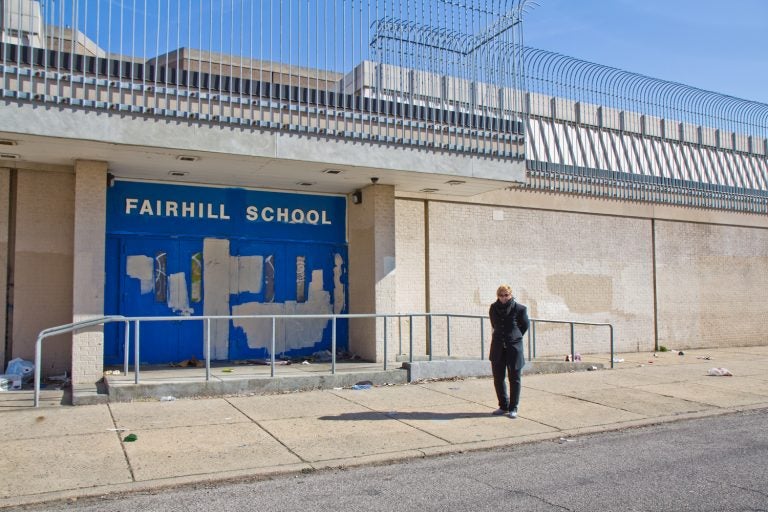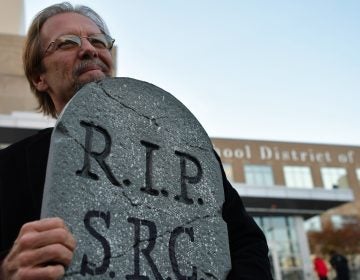From schools to scourge: Why 7 Philly schools remain empty 5 years after going on the auction block
When the School Reform Commission went against neighborhood desires and closed Fairhill along with 21 other schools in 2013, officials promised to sell the buildings.

Marilyn Rodriguez was formerly a teacher at Fairhill Elementary School. (Kimberly Paynter/WHYY)
Broken glass, withered pieces of cardboard and used diapers lay at the front door of former Fairhill Elementary School. Graffiti pierces through a careless paint job. Windows are pried open.
Marilyn Rodriguez, who lives around the corner from the school, once taught in its classrooms. She has watched the building’s condition deteriorate steadily since the School District of Philadelphia closed it after the 2013 school year.
“It’s become a homeless and vacant spot for people to sleep in,” Rodriguez said of the school, which served a mostly Latino population. “Sometimes they put the cars in front of it, and they burn them.”
It wasn’t supposed to be this way. When the School Reform Commission went against neighborhood desires and closed Fairhill along with 21 other schools in 2013, officials promised to sell the buildings and ensure that blight didn’t set in.
While these school closures stunned Philadelphia — and many neighborhoods protested the loss of these anchors rooted in memories — the city has moved on. Most of the reactivated buildings returned as educational facilities; some are still owned by the district and others were sold to charter operators for reuse.
Four were converted into housing — a mix of high-end and affordable projects, depending on the neighborhood. One school in the Allegheny West section of North Philadelphia became a used car lot.
A few other schools have gone onto high-profile second lives under private ownership. Edward Bok Technical School in South Philly, for instance, became a hub for local businesses and artists with a glam restaurant and rooftop bar. University City High was demolished to make way for UCity Square, a $1 billion “innovation district” developed by Drexel University and Wexford Science and Technology, a real estate company that focuses on the biotech sector.
But Fairhill never sold. Five years after the schools were put on the auction block, this hulking building is one of 7 vacant properties from the mass SRC closure with no known plans for reuse. All of these vacant buildings occupy neighborhoods where poverty rates run high, and residents are used to property owners abandoning their claim.
Two are in Germantown, two in Eastwick and two more are in North Philadelphia — one in Sharswood and another in Kensington, not too far from Fairhill.
Developers own three of these empty buildings — Sheridan West Academy in Kensington, Germantown High and Fulton Elementary School in Germantown.
Meanwhile, the District handed off management of George Wharton Pepper Middle and Communications Tech High in Eastwick to the Philadelphia Redevelopment Authority. Under an agreement approved last week, the state-chartered agency will manage the buildings’ sale as part of a major master planning effort in the area.
Studies commissioned by the PRA imagine transforming the former high school into a community center and demolishing Pepper, a brutalist icon built in a low-lying bowl-shaped area, but nothing has been finalized. “The Pepper School site needs additional study due to flooding issues,” said Jamila Davis, a PRA spokeswoman. “We are working on an RFP and hope to have it on the street this summer.”
The empty Sharswood building, General John F. Reynolds School, was bought by the Philadelphia Housing Authority, which plans to eventually reuse it as part of a long-term neighborhood redevelopment plan.
Yet for the neighborhoods saddled with these empty schools, the closures left an open wound that is only getting worse with time.
“We’ve had assaults back there. We’ve had people living back there, people tearing out the copper and metal in the building,” said the Rev. Gregory Holston, senior pastor for Janes Memorial United Methodist Church. He can see the Germantown High School from the window in his office.
Developer Jack Azran bought the massive building for $100,000 in May 2017 from the developer who first purchased it from the district. He hasn’t yet released development plans, but, to the chagrin of nearby neighbors, leaked marketing documents show a suburban-style discount strip mall.
Azran, who owes hundreds of thousands of dollars in back taxes on the building, declined to comment on his plans for its future. The school is set to be auctioned at a May 15 tax sale because of the unpaid debt. The opening bid is listed as $1,500.
Pew Charitable Trusts researchers who studied similar public school auctions in Chicago and Kansas City warned local officials that vacancy would likely follow closures in neighborhoods already struggling with blight and abandonment.
“Just selling a building doesn’t solve the problem,” said Larry Eichel, director of the Philadelphia Research Initiative at Pew Charitable Trusts. “From the district’s point of view, yeah, they make a little bit of money. From the community point of view, that may not solve anything.”
Imagining the future
William Collins is the managing principal for the Concordia Group, which purchased five schools during the 2013 auction process, including Germantown High. Two years ago they offloaded all but one property — Abigail Vare School in Pennsport.
The developers recently finished construction at the Vare site. Now a stylish apartment complex called The Lofts at Abigail Vare, studios rent for upwards of $1,100. But Collins said it was in Concordia’s best interest to sell the other properties because they were too far from the booming Center City neighborhoods where the company’s other projects are located.
“Geographically, we could handle a day-to-day project,” Collins said of the Vare site, “Because it was around the corner from another project we were working on.”
Eichel said a shuttered school typically follows other community upsets such as a loss of businesses.
“It becomes a symbol of what’s going on,” Eichel said. “A painful symbol.”
Even so, neighbors have come together in Fairhill to improve the space. On one side of the building, they have planted flowers and started to tend a community garden. As the weather gets warmer, people are playing dominos in the parking lot.
“They are making it look better,” said Rodriguez.
But the former teacher still worries about the school’s future. She fears it will eventually meet the same fate as Edison High School, which burned in 2011 after sitting vacant for years.
The School District of Philadelphia declined to comment on the Germantown school and the fate of other schools no longer under its control. As for Fairhill, spokeswoman Megan Lello said the agency is still weighing its options, and that the district is working to reseal the facility.
“At this time, what I can share is that we are reviewing enrollment, housing market, and other data to inform a decision on the Fairhill property,” said Lello in an email.
Rodriguez is hoping for a decision soon. The vacancy of the former neighborhood school has influenced nearby properties, she said.
“It’s really dirty and full of trash,” Rodriguez said. “People just come and dump and dump and dump.”
WHYY is your source for fact-based, in-depth journalism and information. As a nonprofit organization, we rely on financial support from readers like you. Please give today.





